|
|
|
Sort Order |
|
|
|
Items / Page
|
|
|
|
|
|
|
| Srl | Item |
| 1 |
ID:
130618
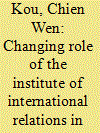

|
|
|
|
|
| Publication |
2014.
|
| Summary/Abstract |
In the past six decades, Taiwan's China studies have undergone a gradual shift from a focus on policy analysis and political introduction to one that is centred on scholarly research with policy analysis as its secondary aim. During this process, the role of the IIT has shifted from that of a government think thank, monopolizing China studies and serving the top brass jointly with other state-dominated research units, to a competitor for academic achievement and policy influence in a pluralistic academic and political market.
|
|
|
|
|
|
|
|
|
|
|
|
|
|
|
|
| 2 |
ID:
130615
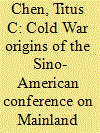

|
|
|
|
|
| Publication |
2014.
|
| Summary/Abstract |
this article adopts a reflexive approach to investigate the history of the Sino-American Conference on mainland China (SACMC), the Cold War precursor of the Taiwan - US Conference on contemporary China (TUSCCC) organized and hosted by the institute of international relations (IIR) of the republic of China , the Cold war origins of the SACMC demonstrate the nation that power and knowledge- the practice of politics and theory of politics are asymmetrically and symbiotically co-constitute.
|
|
|
|
|
|
|
|
|
|
|
|
|
|
|
|
| 3 |
ID:
133068
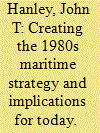

|
|
|
|
|
| Publication |
2014.
|
| Summary/Abstract |
While important differences exist, the first decade of the twenty-first century paralleled the 1970s for the Department of Defense and the U.S. Navy. U.S. armed forces were embroiled in extended and expensive counterinsurgency wars. American military equipment was growing old, budgets were tight, and extended projections called for significant decreases in the nation's armed forces, just as the main prospective military adversary was both rapidly modernizing and expanding its forces, particularly its navy. "From 1962 to 1972, the navy had programmed the construction of 42 ships per year, but between 1968 and 1975 only 12 ships, or less than a third as many per year, were programmed. In 1975, given the age of ships already at sea, and the navy-expected service life for a warship of 25-30 years, the service anticipated retiring about 4 percent of the active fleet each year."1 The Soviets were extending their defensive perimeter from two to three thousand kilometers.2 Today, the Chinese suggest extending their defensive perimeter from the "first island chain," enclosing the East and South China Seas, to the second, bounded by the Marianas, three thousand kilometers from the Chinese coast.3 In the 1970s, the United States questioned its own ability to fight forward, defend allies, and achieve objectives -as many defense analysts and many in the Navy do now.
|
|
|
|
|
|
|
|
|
|
|
|
|
|
|
|
| 4 |
ID:
128273
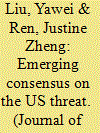

|
|
|
|
|
| Publication |
2014.
|
| Summary/Abstract |
Though the PLA elite perceptions of the United States have fluctuated over time, there has been some regularity in the evolution of their perceptions. Comparing the dominant perceptions of the United States among different generations of Chinese military elites in the PRC, we find that the PLA elite perceptions of US intentions have been foremost influenced by China's strategic interest in a certain period, rather than the level and intensity of bilateral exchanges at the time. Using the case of US arms sales to Taiwan and the case of the South China Sea and the Diaoyu Islands, we try to assess how consistent and persistent PLA elite perceptions of the US have been in recent years. While we agree that these outspoken military men cannot be taken on the surface as indicative of China's national policies, we will also point out several important dimensions that are likely to allow the PLA to play a more influential role in setting the agenda for China's strategic interest in the era of Xi Jinping.
|
|
|
|
|
|
|
|
|
|
|
|
|
|
|
|
| 5 |
ID:
124635
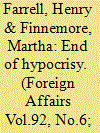

|
|
|
|
|
| Publication |
2013.
|
| Summary/Abstract |
The U.S. government seems outraged that people are leaking classified materials about its less attractive behavior. It certainly acts that way: three years ago, after Chelsea Manning, an army private then known as Bradley Manning, turned over hundreds of thousands of classified cables to the anti-secrecy group WikiLeaks, U.S. authorities imprisoned the soldier under conditions that the UN special rapporteur on torture deemed cruel and inhumane. The Senate's top Republican, Mitch McConnell, appearing on Meet the Press shortly thereafter, called WikiLeaks' founder, Julian Assange, "a high-tech terrorist."
|
|
|
|
|
|
|
|
|
|
|
|
|
|
|
|
| 6 |
ID:
124377
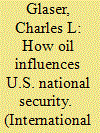

|
|
|
|
|
| Publication |
2013.
|
| Summary/Abstract |
How do states' oil requirements influence U.S. national security? Although a great deal of attention has focused on "energy security," scholars and policymakers lack satisfactory answers because little analysis links states' energy requirements with the probability of military conflict. Developing an analytic catalogue of the ways in which states' oil requirements could influence U.S. national security is the first step in closing this gap. Possible mechanisms include vulnerable access to oil that threatens a state's military capability; military policies designed to protect access to oil that threaten another state's military capability, which in turn create an access-driven security dilemma; and oil reserves that increase the value of territory, generating a conflict that draws in the United States via an alliance commitment. A distinctive feature of this framework is that some of these mechanisms identify threats to U.S. security that flow from another country's consumption of oil, not from U.S. consumption. Of particular importance is the potential danger that Chinese oil imports create for U.S. security-China's efforts to protect its sea lines of communication are fueling military competition that could strain U.S.-China relations and increase the probability of conflict between them. Policy options for dealing with these dangers share little with the standard options prescribed for dealing with the dangers related to Persian Gulf oil and U.S. oil consumption.
|
|
|
|
|
|
|
|
|
|
|
|
|
|
|
|
| 7 |
ID:
131593
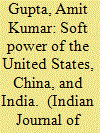

|
|
|
|
|
| Publication |
2013.
|
| Summary/Abstract |
As countries compete for dominance in International Politics, soft power has emerged as a major tool for nation states to ensure enhancement of their intangible standing, besides strengthening their in?uence in a benign way. The United States, China and India are considered prime examples in the ?eld of soft power, though the nature, intent, and fruition of soft power vary in each case. This article attempts to highlight and analyze the diverse nature of soft power that these countries possess, and illuminate as to how di?etently they have used their soft power resources. And ?nally an attempt has been made to put forward a case that each of these countries presents itself as an archetype-- they may learn from each other's successes and missteps in the domain of soft power.
|
|
|
|
|
|
|
|
|
|
|
|
|
|
|
|
| 8 |
ID:
132009
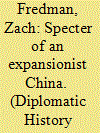

|
|
|
|
|
| Publication |
2014.
|
| Summary/Abstract |
The Chinese Revolution, Korean War, and McCarthyism loomed large over Kennedy administration assessments of Chinese intentions in Vietnam. The president and his advisors disagreed over the exact nature of the Chinese threat, but they uniformly believed in a dangerous, expansionist China. Their assessments promoted cautious escalation in Vietnam, where Kennedy sought to avoid "losing" another Asian country to Communism without provoking another war like Korea. This, in turn, promoted Chinese militancy. Central to Kennedy administration thinking was the idea that Vietnam served as a test case for Beijing's more radical foreign policy line vis-à-vis Moscow. This article traces the development and influence of such assessments. It also argues that the China factor informed Kennedy and Johnson administration notions of credibility. Holding back or reversing Communist gains in Asia by supporting Saigon offered these administrations the chance to kick once and for all the "who lost China" stigma that had haunted the Democratic Party since 1949.
|
|
|
|
|
|
|
|
|
|
|
|
|
|
|
|
|
|
|
|
|